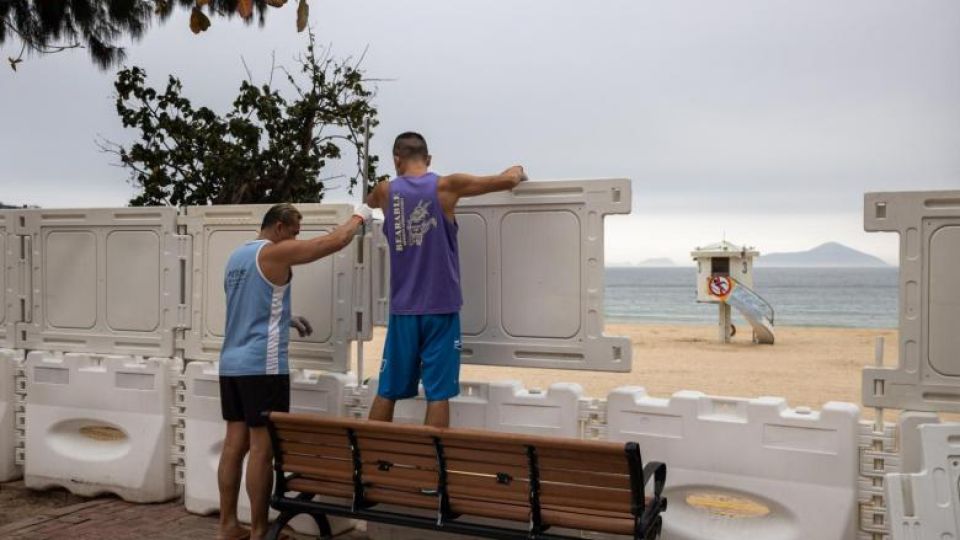March 18, 2022
HONG KONG – There is no doubt that the central government is highly concerned about the fifth wave of the COVID-19 outbreak caused by the contagious omicron variant in Hong Kong, and that it will make every effort to support the special administrative region’s fight against the virus, as evidenced by the initiatives and moves that keep rolling out.
When hundreds of thousands of infection cases emerged on a daily basis in Hong Kong, President Xi Jinping instructed the central government authorities to offer whatever assistance the SAR needs. Later on, when the city recorded four-digit daily infection cases, Xi made new directives again. In response, Vice-Premier Han Zheng, together with Xia Baolong, director of the Hong Kong and Macao Affairs Office of the State Council, flew to Shenzhen at once to convey Xi’s messages for Hong Kong, which emphasize that the SAR government shall shoulder the main responsibility for reining in the outbreak in the city, which should be the top priority for Hong Kong at this moment, and that the SAR government should mobilize all manpower and resources available, and take necessary measures to ensure the health and safety of Hong Kong residents, as well as the social stability of the region.
For several days upon his arrival at Shenzhen, Xia convened meetings with officials from various central government departments and municipal governments to come up with measures to support Hong Kong in repelling the virus. Health experts and medical supplies were quickly dispatched to give Hong Kong a hand. In a statement explaining the central government’s unreserved support, Han and Xia have made it clear that as long as Hong Kong asks for help, the motherland will surely respond to it.
Han reiterated that the central government will step up efforts to support Hong Kong’s fight against the pandemic, as part of the broader effort to help Hong Kong fulfill its primary responsibility for reining in the raging outbreaks.
In view of the actual pandemic situation in Hong Kong, the anti-pandemic experts from the Chinese mainland have put more emphasis on cutting down the severe infections and death cases, urging the SAR authority to prioritize safeguarding the elderly and children, who are much more vulnerable to the virus’ attack.
Han noticed that it only took a week for mainland contractors to build the Tsing Yi makeshift isolation facility, but it took the SAR authority five days to admit only 272 COVID-19 patients into this facility, equivalent to 7 percent of the occupancy rate. Obviously, there is a lot of room for improvement in the administrative mechanism of anti-pandemic work.
While the central government and the Guangdong provincial government are putting in every effort to back Hong Kong’s anti-pandemic initiatives, the SAR authority must be more aggressive in taking up the core responsibility for neutralizing the health threat by streamlining the anti-pandemic mechanism and thus efficiency.
Prior to the commencement of the two sessions in Beijing, Xia acknowledged the efforts made by the central authorities and mainland municipal governments in assisting Hong Kong to overcome its predicament in the seventh anti-pandemic coordination meeting. He later stressed that the principal officials of the SAR government must have the courage to take on responsibilities and arduous tasks, play the organizational leadership role, and take concrete actions to bring their oath of office into reality in the COVID-19 battle.
The onslaught of the fifth wave of the COVID-19 outbreak has highlighted Hong Kong’s reluctance to prioritize people’s lives and health over other concerns such as economic interests. Indeed, the ethos of liberal capitalism has hindered the adoption of a people-centric development concept in Hong Kong’s public health service. Hong Kong will need to modernize its public healthcare system and incorporate the people-centric and life-above-all precepts. Unfortunately, it takes time for any institutional reforms to take effect.
The pandemic is raging, with total infections having shot up to more than 650,000. For the time being, the overriding mission is to rein in the virus as soon as possible. The top priority is to cut down the number of severe cases and deaths by putting much more effort in protecting the elderly and children who are more vulnerable to the virus attack, particularly by boosting the vaccination rate among these two groups as fast as possible.
As the local administration has repeatedly declared that Hong Kong is at war with the virus; it should take extraordinary measures; namely, the invocation of the emergency law, to mobilize all available manpower and resources to do whatever is necessary to fight the virus.
For example, the SAR government should enlist private hospitals to make up the shortfall in capacity at public hospitals, with the resultant losses in revenue compensated with public funds. Hopefully, owners and operators of private hospitals will take up their social responsibilities for the greater good.
Schools, especially universities, should collaborate with the government by offering venues for the accommodation of mild COVID-19 patients on a temporary basis.
To ensure the effectiveness of home quarantine, the number of people undergoing home isolation must be kept below a certain level. Officials will have to review their living conditions and make necessary arrangements to ensure their subsistence.
The central government and the Chinese mainland can be counted on for help, but the main responsibility for neutralizing the health threat lies with Chief Executive Carrie Lam Cheng Yuet-ngor and her governing team. They must spare no effort to outwit the coronavirus.


